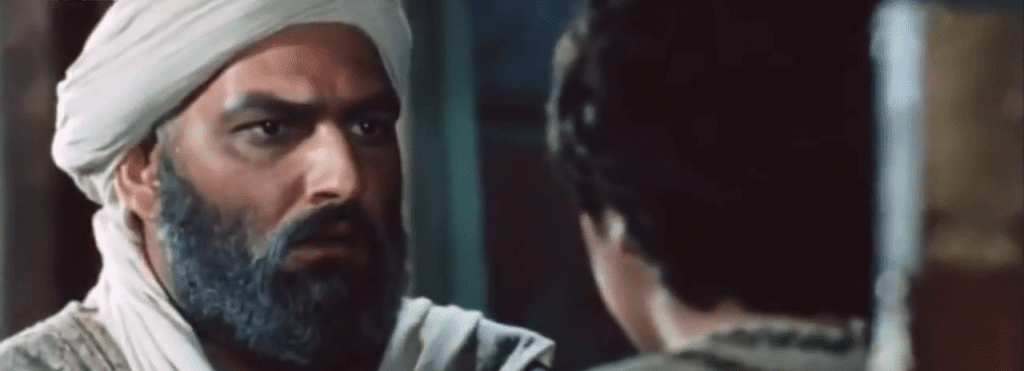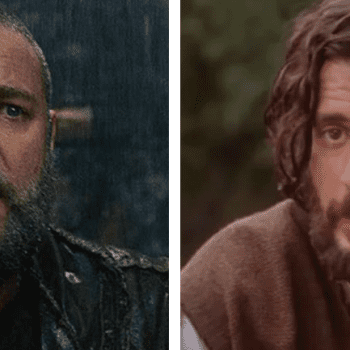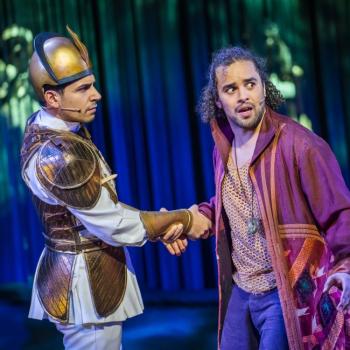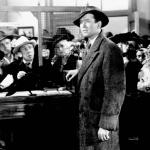Synopsis. Ghetmir, a member of the caravan that bought Joseph from his brothers, finds Joseph crying by his mother’s grave. Ghetmir strikes him, and Jacob, sitting miles away, senses that something is wrong. Ghetmir is about to strike Joseph again when a pain shoots through his hand. That night, Ghetmir asks Ishtar to heal his arm, but he tosses his idol away when Joseph heals his arm instead. Later, another sick member of the caravan is healed after Joseph spends time with him. After the caravan arrives in Egypt, another member of the caravan tells Joseph he wants to become a believer in Joseph’s God, and Joseph replies that the man already is a believer.
As the tenth episode begins, Jacob is still at home, asking God to give him back his son. Meanwhile, in Egypt, Malek, the leader of the caravan, holds an auction and sells Joseph to Potiphar for a lot of money. Potiphar takes Joseph home and introduces him to his wife, Zuleikha. Meanwhile, Malek realizes that he may have made a mistake — that he may have sold an actual prophet as a slave. Malek goes to Potiphar’s palace and says he wants to cancel the deal, and Potiphar, enraged, is about to send Malek to prison when Joseph intervenes. Malek and his friend are tossed out of Potiphar’s home, and Malek tells his friend he can’t leave the city as long as Joseph is in there.
Muslim tradition. The Egyptian nobleman who buys Joseph is known in the Bible as Potiphar and in the Koran (12.30) as al-Aziz, and his wife is anonymous in the Bible but is known as Zuleikha in the Muslim tradition. This series uses the biblical name for the Egyptian nobleman and the Muslim name for his wife, and so will I.
The Koran (12.21) says Potiphar told his wife they might be able to adopt Joseph as a son; the Potiphar of this series tells Zuleikha that, too. Some Muslim commentators have inferred from this that Potiphar and Zuleikha were childless and, further, that Potiphar may have been a eunuch who could not satisfy his wife’s sexual needs — thus explaining why she tries to seduce the adult Joseph at a later point in the story.1
The Bible says Joseph was “well-built and handsome,” and the Muslim tradition agrees that his beauty was very distracting — and not only to women, apparently. In the tenth episode, when Joseph is put on the auction block, a massive bidding war ensues, partly because the men of Egypt are drawn to his beauty. And after Joseph is taken to Potiphar’s house, the servants there marvel at his beauty, too.
Zuleikha, on meeting Joseph, says, “Haven’t I seen this kid before? In my dreams, maybe.” The story of Joseph and Zuleikha has attracted a great deal of literary attention in the Muslim tradition, and at least some versions of the story — such as the 15th-century poem by the Persian poet Jami available in this PDF file — say Zuleikha had dreams about Joseph long before she met him. The 1995 TV-movie Slave of Dreams, starring Sherilyn Fenn as Zuleikha, also explores this premise.
Pious Joseph. Joseph is something of an evangelist for monotheism; he heals people, gives all the credit to God, and gently points people away from their idolatry.
He is also rather full of equanimity. Malek asks if Joseph hates Ghetmir for striking him, and Joseph replies that he hasn’t been taught to hate. And when Malek discovers that he and Joseph are cousins — and that this means he has sold one of his own kinsmen into slavery — Joseph says it’s okay, it was his destiny to be a slave in Egypt; he even thanks Malek for selling him into slavery and supporting his destiny.
Potiphar also notices that Joseph never bows to him or his wife Zuleikha.
The supernatural. At least two men are healed thanks to Joseph’s intervention. It is also suggested that it starts raining at one point because of Joseph. Later, Joseph is visited again by the angel who met him in the well — once when Joseph is on the auction block, and once again after Joseph has arrived at Potiphar’s house.
God versus the gods. The first two episodes focused on a contest of sorts between Jacob’s God and the Babylonian goddess Ishtar, prior to Joseph’s birth. That theme returns here as we learn that several members of the caravan are followers of Ishtar — but a few of them reject their idols and decide to follow the God of Abraham when they see the wonders performed by Joseph. One of these converts even says he will go back to his village and teach his polytheist neighbours to follow the one true God.
Family dynamics. Both of these episodes include brief scenes of Jacob’s family in Canaan, even though Joseph has moved away from them permanently to Egypt.
Jacob tells his sons there will be no more blessings or grace for their tribe because of Joseph’s disappearance, and both he and Leah hold Levi particularly responsible for the fact that Joseph is no longer with them. (They do not know that Levi cannot defend himself because Joseph made him promise not to tell them what happened.)
Jacob tells Leah they should try asking their sons what happened to Joseph again. In a voice-over, he says he wants his sons to admit their sin so that God can forgive them.
Other tribes. These episodes clarify that Malek, the caravan leader who buys Joseph from the brothers and sells him to Potiphar, is a great-grandson of Ishmael and is thus a relative of Joseph (who is a grandson of Ishmael’s half-brother Isaac) — but Malek does not learn that Joseph is his cousin until after he has sold him to Potiphar.
As the caravan approaches Egypt, Malek explains to Joseph that tribes like the Hejaz and the Balal don’t have clear borders, but Egypt is a land of “culture.”
Egypt. Malek introduces Joseph to various aspects of Egyptian culture as the caravan makes its way from the border to Thebes (a 129-hour non-stop walk south of Cairo). Joseph is amazed by the abundance of sheep and cats, and Malek says Egypt is known as the land of snakes, and that the Egyptians believe a snake-dragon protects the country. Joseph is also told it is a crime to believe in the one God in Egypt.
Malek says Thebes is known as “the city of a hundred gates” even though it actually has only ten gates. He also mentions that Thebes is the city of the god Amon, and that the Pharaoh Amonhotep lives here. This raises interesting chronological issues.
There were four Pharaohs named Amenhotep, all of whom reigned between 1524 BC and 1334 BC as part of the Eighteenth Dynasty. They all had Thebes as their capital city — except for the final Amenhotep who renamed himself Akhenaten and moved his capital to Akhetaten when he embraced a form of monotheistic sun-worship.
It would be reasonable to assume that the series is taking place during this period — and we might even speculate that, in future episodes, Joseph will play a role in Akhenaten’s turn towards monotheism. The problem is, a subtitle in the first episode said it took place in 1160 BC, and roughly ten years have passed since then.
So these episodes are taking place at least two centuries too late. Though it is possible the subtitle on that first episode was a mistranslation. Ah well, we’ll see.
Visuals. One member of the caravan has a dream that has a few visual effects.
The angel walks through the crowd towards Joseph prior to the auction; he is unseen by the crowd, and at one point his body passes through the bodies of two men.
Themes. As noted above, the beauty of Joseph is a recurring theme here, and it leads to a remarkable conversation between Joseph and the angel when Joseph sees all the Egyptian men gathered before the auction block. The angel declares that Joseph’s outward beauty is symbolic of the beauty within all human beings, and that these men, who lack the wisdom and innocence to see the beauty inside themselves, find Joseph’s physical beauty irresistible because it ultimately points towards Joseph’s God.
–
Episodes: 1-2 | 3-4 | 5-6 | 7-8 | 9-10 | 11-12 | 13-14 | 15-16 | 17-18 | 19-20 | 21-22 | 23-24 | 25-26 | 27-28 | 29-30 | 31-32 | 33-34 | 35-36 | 37-38 | 39-40 | 41-42 | 43-45
–
The subtitled version of these episodes runs from about 35:20 to 2:02:40 in this video:
And here are the English-dubbed versions of these episodes:
–
1. The Potiphar character in Youssef Chahine’s The Emigrant (1994) is explicitly identified as a eunuch.













